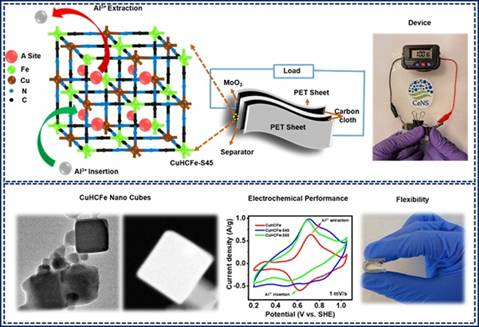Bengaluru Scientists Develop Safe, Foldable Aluminum-Ion Battery Technology
Lithium-ion batteries currently dominate global markets, powering phones, laptops, wearables, and electric vehicles.

- Country:
- India
In a breakthrough that could redefine energy storage, scientists in Bengaluru have developed a novel battery technology that is flexible enough to fold like paper, safe to touch, and far more sustainable than conventional lithium-ion batteries. The innovation comes from the Centre for Nano and Soft Matter Sciences (CeNS), an autonomous institute under the Department of Science and Technology (DST), Government of India, working in collaboration with the Centre for Nano Science and Engineering (CeNSE) at the Indian Institute of Science (IISc).
The Problem with Lithium-Ion Batteries
Lithium-ion batteries currently dominate global markets, powering phones, laptops, wearables, and electric vehicles. However, they suffer from significant drawbacks:
-
Risk of overheating and explosions due to thermal runaway.
-
High environmental costs of mining lithium and cobalt.
-
Limited recycling potential, adding to electronic waste.
These limitations have spurred research worldwide into safer, cheaper, and more sustainable alternatives.
Aluminum: An Abundant and Safer Alternative
The new battery uses aluminum, one of Earth’s most abundant and recyclable metals, along with a water-based electrolyte solution. This makes the battery:
-
Safer – minimizing risks of fire or explosion.
-
Cheaper – reducing reliance on rare and costly elements.
-
Eco-friendly – significantly lowering environmental hazards.
Though aluminum has long been recognized for its potential in energy storage, its complex chemistry has posed challenges in practical use.
The Scientific Breakthrough
The Bengaluru researchers overcame these hurdles by designing unique electrode materials at the microscopic level:
-
Cathode (positive electrode): made from copper hexacyanoferrate (CuHCFe), pre-filled with aluminum ions.
-
Anode (negative electrode): crafted from molybdenum trioxide (MoO₃).
This pairing enabled smooth energy transfer, giving rise to a powerful, flexible, and durable battery.
Performance and Flexibility
The new aluminum-ion battery has shown remarkable results:
-
Retains 96.77% of its power even after 150 charge-discharge cycles, showing strong durability.
-
Remains functional when bent or folded completely in half.
-
Successfully powered an LCD display, even under extreme bending conditions.
This flexibility makes it ideal for next-generation devices, such as foldable smartphones, rollable displays, and wearable gadgets seamlessly integrated into clothing.
Advanced Testing and Validation
To achieve this, scientists used electron microscopes and spectroscopic tools to carefully balance the composition of electrode materials. Rigorous testing confirmed the battery’s:
-
Efficiency – storing and releasing energy reliably.
-
Durability – sustaining long-term usage without significant power loss.
-
Flexibility – maintaining stable performance even under stress.
Implications for Technology and Sustainability
The potential applications of this innovation are vast:
-
Wearable electronics integrated into fabrics.
-
Foldable and rollable smartphones with safer batteries.
-
Safer electric vehicles using non-flammable power sources.
-
Environmentally sustainable energy storage, supporting India’s clean energy transition.
The use of aluminum not only ensures cost-effectiveness but also aligns with global environmental goals, making this innovation a step toward a circular economy in energy storage.
India at the Forefront of Next-Gen Battery Tech
This development marks a significant stride in multivalent ion battery technology. With continued refinement, aluminum-ion batteries could soon become mainstream, placing India at the forefront of safe, flexible, and sustainable battery innovation.
As the world seeks to move away from lithium dependency, Bengaluru’s scientists have opened the door to a future where energy storage is safer, greener, and smarter.










